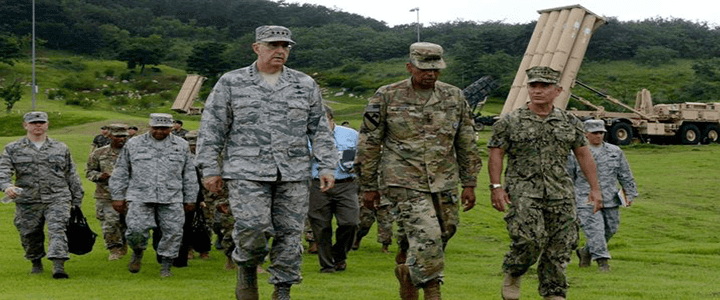The simmering tensions between the United States and a nuclear-armed Democratic People’s Republic of Korea, and the Democrats’ disdain for all things Trump, combined to make last week an interesting one. On Tuesday, the Senate Foreign Relations Committee held a hearing to discuss the president’s authority to launch nuclear weapons. Then on Saturday, appearing at the Halifax International Security Forum, Air Force Gen. John E. Hyten, commander of U.S. Strategic Command, addressed the theoretical use of nuclear weapons, including how he would respond to an “illegal” order.
Pushing back on an “illegal” order?
Hyten’s remarks no doubt brought great joy to those who would prefer to see the president removed from office, but as is often the case, the headlines are somewhat misleading. The headline for the Associated Press article read “US general says illegal nuclear launch order can be refused.” That headline and the accompanying article have appeared in tens of thousands of places in print and on the web since it was published.
The problem is, that’s not what Hyten, who is the senior military officer responsible for oversight of the the country’s nuclear arsenal, actually said. His answer, like much actual discussion of policy details, is much more nuanced… too nuanced to be encapsulated in a pithy headline.
Hyten was discussing how he, like every other member of the military, undergoes annual training in the Law of Armed Conflict. Precedents established at the Nuremberg trials of Nazi war criminals following the Second World War hold that “following orders” is not sufficient to absolve one from culpability in the commission of a war crime. As explained in Army Field Manual 27-10, “The Law of Land Warfare,” a person following an illegal order is guilty of a war crime “unless he did not know and could not reasonably have been expected to know that the act ordered was unlawful.” [Emphasis added]
So what did hyten actually say?
Hyten was participating in a panel discussion entitled “Nukes: The Fire and the Fury.” moderated by Steve Clemons, founder and senior fellow of the American Strategy Program at the Washington think tank New America Foundation, and an editor-at-large for The Atlantic. Clemons referred to the testimony of Hyten’s predecessor at USSTRATCOM, retired Air Force Gen. C. Robert Kehler, at the Senate hearing on Tuesday.
In that testimony, Kehler said service members are obligated “to follow orders provided they are legal and come from appropriate command authority,” adding, “They are equally bound to question (and ultimately refuse) illegal orders or those that do not come from appropriate authority.” He said that it was the job of senior military leaders “to pose the hard questions, if any, before proceeding with our military advice.”
Clemons wanted to know if Hylten had thought about what such a conversation might be like. Nothing Hyten said, despite the splashy headline, contradicted Kehler.
“The way the process works,” Hyten said, “is it’s simple. I provide advice to the president, he’ll tell me what to do, and if it’s illegal, guess what’s going to happen. I’m going to say, ‘Mr President, that’s illegal.’ And guess what he’s going to do? He’s going to say, ‘What would be legal?’ And we’ll come up with options, with a mix of capabilities to respond to whatever the situation is, and that’s the way it works.”
There are those who honestly and seriously believe that any use of nuclear weapons in any circumstance would constitute a war crime. So it’s natural that they would be encouraged by the tantalizing thought of the brass defying the president. But Hyten’s measured and thoughtful response is a far cry from the wishful thinking that the nation’s senior military leadership is willing to openly defy the president should he order a nuclear attack.




